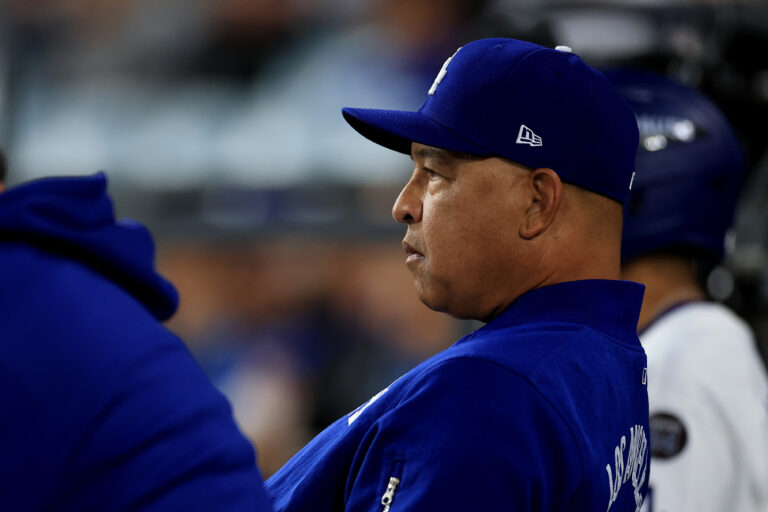Dave Roberts, the manager of the Los Angeles Dodgers, has taken great care in these past few years not to act smug or entitled about being the man who guides the best-paid team in American sporting history. That Roberts has more or less pulled it off is one of the great achievements of his stint in that role, but even he cannot hold up the charade any longer. Roberts has decided this gig is so easy that he needs to introduce a new challenge to keep things interesting, and this October, he has decided to win games with his own bullpen tied behind his back, his wrists bound by the cord on the deactivated dugout telephone. It’s going well.
Roberts has had perfectly good tactical reasons to let his starting pitchers go on forever in the first two games of the National League Championship Series against Milwaukee; if the Brewers want to pay homage to the dead ball era, Roberts might as well let his starters do their best Mickey Lolich imitations, too. But there is a bit of the imp in Roberts, and he has won these two games while mostly sitting rather than leaning on the dugout railing; if this were an earlier time, he’d be in a rocker and smoking a brier pipe. Those analytics drones who have seen the diminution of the manager’s position can finally point to the Dodgers and shriek, “Excelsior! Proof, if proof were still needed, that we’ve been right all along!”
Last night’s 5-1 win was dominated by Yoshinobu Yamamoto, who did some new and startling things after doing the new cool kids’ thing of giving up a leadoff home run and then allowing nothing else. Yamamoto has topped 100 pitches in 10 starts this year, so this was not a physical stretch for him—impressive, but not especially extraordinary. It was an overwhelming start from a bordering-on-great starting pitcher, and very well-timed.
No, the real achievement here belongs to Roberts, because he is breaking habits he has learned over his nine years as a manager, most notably that of jumping up and walking to the mound to turn one pitcher into another pitcher. Six years ago, the Dodgers were among the least reliever-crazed teams in baseball, but they have climbed that ladder slowly but surely over the ensuing years to the point where the only team that worked its bullpen harder this season was the Chicago White Sox. Their excuse is obvious.
To be fair, though, the Dodgers’ excuse is nearly as obvious, given that much of their rotation was injured for much of the year for the second year running. Yamamoto was the only one to make 30 starts; Clayton Kershaw, currently serving as the best-credentialed long man in baseball history, was second with 23. The Dodgers used 17 starters in total and 40 pitchers overall, a year after using…17 starters and 40 pitchers overall. Last year, too, only two Dodgers pitchers made 20 starts; go on, guess—yes, you’re right, it was Gavin Stone and Tyler Glasnow. That churn around the mound has kept Roberts very busy, and his team seemed both ready and likely to grind through their bullpen on a daily basis en route to their standard divisional championship. They did it last year, after all, and you may remember how that season ended.
So it was strange, then, watching Yamamoto throw nine innings a day after Blake Snell threw eight; Snell could probably have thrown the ninth without much additional effort, and the fact that he didn’t led to the only faint notes of tension that this series has delivered so far. This feels less like a grand strategy coming together and more like the Dodgers finally enjoying the full flower of the pitching rotation they paid so much for; part of that is Roberts finally being able to manage the games as if he were working remotely from Fiji, in flip flops, while swaying lightly on a hammock under a palm tree. The Brewers were the charming tale of the season, winning the most games with a modest payroll and a flair for the dramatic, and now the only thing they are getting to show is the number of ways they can reach first, turn right, and trot back to the dugout.
Some dramatists have sought to turn this series into a debate about the need for a salary cap in baseball, which if nothing else has delivered a litmus test for learning who among your baseball-watching fans should be disinvited to your next party. But that tedious topic has been part of the baseball debate since George Steinbrenner was throwing money around and firing Billy Martin every nine weeks half a century ago. The real question is whether the Dodgers should credential Roberts for the three games in Los Angeles that start on Thursday, and if they do, whether they should dress him up in a suit like a strangulated Connie Mack. Now that the Dodgers are pretending these are the good old days, when men were men and relief pitchers could spend whole games spitting sunflower seeds for distance and accuracy, why not make the rest of the postseason into a full-dress period piece?
And if you want to make this about the Dodgers spending too much money for the games to be fair, consider this: They are six games away from winning a championship with almost no contributions from the player they are paying the most. Shohei Ohtani is hitting .147 with an OPS of .599 in October, and is 3-for-29 since his two-homer day in Game 1 against Cincinnati two series ago. So far, he is essentially doing nothing but bringing the team’s numbers down. But he’ll get his chance to make a material difference on Friday night, when he is scheduled to start Game Four. Under the new Roberts, he is likely to have to pitch all night.


